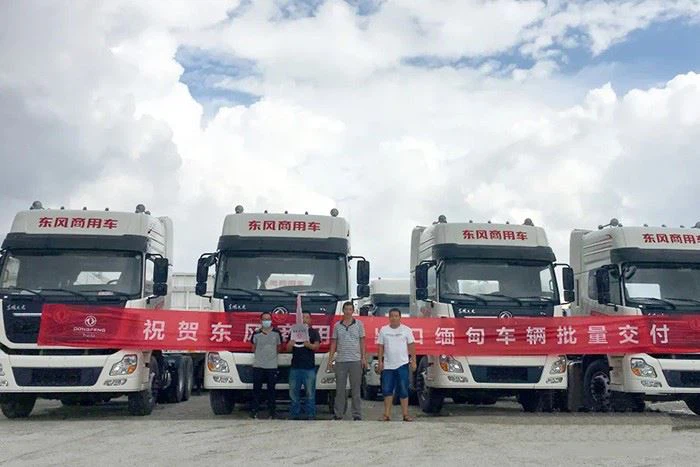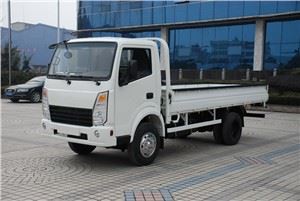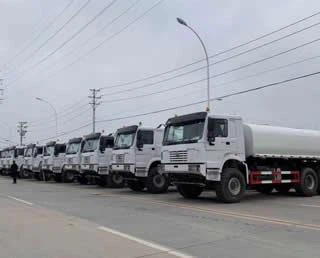Understanding Roll Off Flatbed Trucks: A Comprehensive Guide

Roll off flatbed trucks play a vital role in the transport sector, particularly in construction, agriculture, and waste management. These specialized vehicles are designed to make loading and unloading heavy materials easier, with a unique rolling mechanism that allows the flatbed to detach from the truck. In this article, we will explore the various aspects of roll off flatbed trucks, including their construction, types, applications, features, and maintenance tips. We will also answer some frequently asked questions to provide further clarity.
What is a Roll Off Flatbed Truck?

A roll off flatbed truck is a heavy-duty vehicle designed specifically for transporting large and heavy loads. This type of truck comes equipped with a hydraulic system that allows the flatbed to be rolled off the truck chassis, simplifying the loading and unloading processes. Unlike traditional flatbed trucks, roll off flatbed trucks offer the added benefit of a detachable load bed, making them versatile for a range of applications.
Components of a Roll Off Flatbed Truck
| Component | Description |
|---|---|
| Cab | The front section where the driver sits, controls the vehicle, and operates the hydraulic system. |
| Chassis | The base frame supporting the truck’s body, engine, and axles. |
| Hydraulic System | Mechanism that lifts and rolls the flatbed on and off the chassis. |
| Flatbed | The platform where loads are placed, designed for easy loading and unloading. |
| Roller System | Facilitates the movement of the flatbed as it rolls onto and off the truck. |
Types of Roll Off Flatbed Trucks
There are various types of roll off flatbed trucks, each serving different trucking needs. Understanding these types can help in selecting the right truck for specific transportation tasks.
1. Standard Roll Off Flatbed Truck
The standard version features a flat surface designed for transporting various materials such as machinery, lumber, and construction debris. It is commonly used in the construction and manufacturing sectors.
2. Low-Profile Roll Off Flatbed Truck
This type has a lower deck height, making it easier to load and unload heavy equipment with minimal ramp incline. Ideal for heavy machinery transport.
3. Heavy-Duty Roll Off Flatbed Truck
Built to carry significantly heavier loads, these trucks come with reinforced frames and advanced hydraulic systems to support larger weights, making them suitable for industrial applications.
4. Auto Roll Off Flatbed Truck
This variation is specifically designed for transporting vehicles. They often come equipped with features like an integrated winch and specialized attachments to secure vehicles safely during transport.
Applications of Roll Off Flatbed Trucks
Roll off flatbed trucks find applications in various industries due to their versatility. Below are some common usages.
1. Construction Industry
In construction, these trucks are invaluable. They are used to transport heavy building materials, machinery, debris, and more to and from job sites.
2. Agriculture
Farm operators utilize roll off flatbed trucks to transport large agricultural equipment and produce. The ability to easily load and unload makes them essential for farm operations.
3. Waste Management
In waste disposal, roll off trucks simplify the process of transferring large amounts of waste to landfills. They are commonly used with waste containers to facilitate efficient loading and unloading.
4. Manufacturing
Manufacturers use roll off flatbed trucks for moving heavy machinery between facilities or for shipping finished products to distributors.
5. Warehousing and Logistics
These trucks also serve in logistics, transporting goods to and from warehouses. Their ability to quickly load and unload enhances operations efficiency.
Key Features of Roll Off Flatbed Trucks
Understanding the essential features of roll off flatbed trucks can assist businesses and operators in recognizing their value and utility.
1. Hydraulic Lifting System
The hydraulic system is the heart of the roll off mechanism, allowing operators to safely lift and lower the flatbed with precision.
2. Versatile Loading Options
Roll off flatbed trucks can accommodate a variety of loading configurations, including side loading and rear loading, providing flexibility for different projects.
3. Safety Features

Modern roll off trucks come equipped with safety elements such as anti-lock brakes, reflective tape, and secure tie-down points to ensure load security during transport.
4. Robust Construction
These trucks are built to withstand heavy loads and rigorous conditions, often featuring reinforced frames and durable materials that enhance longevity.
Practical Tips for Using Roll Off Flatbed Trucks
To make the most out of a roll off flatbed truck, operators should consider the following tips:
1. Proper Weight Distribution
When loading, ensure the weight is evenly distributed across the flatbed to prevent any potential hazards during transport.
2. Use Quality Tie-Downs
Always use high-quality straps and chains to secure your load. This prevents shifting that can result in accidents or damage during transit.
3. Regular Maintenance Checks
Schedule regular maintenance to check the hydraulic system, brakes, and tires. This will help ensure that the truck operates safely and efficiently.
4. Training for Drivers
Ensure that all drivers receive proper training on how to operate roll off flatbed trucks and understand safety protocols associated with loading and unloading.
Cost Considerations for Roll Off Flatbed Trucks
The cost of acquiring and operating a roll off flatbed truck can vary significantly based on several factors, including the type, brand, and intended use of the truck.
Initial Purchase Cost
The initial price of a new roll off flatbed truck can range from $30,000 to $150,000, depending on its capabilities and features. Used trucks may be available at a lower price but should be thoroughly checked for reliability.
Maintenance Costs
Regular maintenance can cost approximately $500 to $1,500 annually. This includes routine inspections, fluid changes, and necessary repairs.
Fuel Efficiency
Fuel costs depend on the truck’s engine size and load capacity. Proper driving practices can enhance fuel efficiency, saving money in the long run.
How to Choose the Right Roll Off Flatbed Truck
Selecting the right roll off flatbed truck involves careful consideration of various factors to meet specific operational needs.
1. Analyze Your Load Requirements
Determine the types and weights of loads you plan to transport. This will guide you in selecting the appropriate truck size and capacity.
2. Evaluate Your Budget
Consider how much you’re willing to invest. Both new and used trucks have distinct advantages, and your choice should align with operational goals and budget constraints.
3. Research Brands and Models
Look for reputable manufacturers known for quality and reliability. Reviews and recommendations from others in the industry can be valuable resources.
4. Test Drive and Inspection
Whenever possible, test drive potential purchases. Pay attention to the handling, braking efficiency, and ease of the hydraulic operation. Inspect the truck thoroughly to identify any maintenance issues.
FAQs about Roll Off Flatbed Trucks
1. What payload can a roll off flatbed truck typically handle?
The payload capacity usually ranges between 10,000 to 40,000 pounds, depending on the truck’s specifications and design.
2. How do I maintain the hydraulic system of a roll off flatbed truck?
Perform regular inspections for leaks, check fluid levels, and replace any worn-out hoses or seals to keep the hydraulic system in optimal condition.
3. Are roll off flatbed trucks safe for transporting hazardous materials?
Yes, but strict adherence to local regulations and safety protocols is essential. Use specialized containers and secure load properly.
4. What is the difference between a roll off flatbed truck and a traditional flatbed truck?
The key difference is that roll off flatbed trucks allow for easy loading and unloading with a detachable flatbed, while traditional flatbeds do not have this feature.

5. Can roll off flatbed trucks be used for transporting cars?
Yes, specifically designed auto roll off trucks have features to secure vehicles safely during transport.
6. How fuel-efficient are roll off flatbed trucks?
Fuel efficiency varies depending on the truck’s engine, load, and driving conditions, but maintaining proper driving practices can enhance fuel economy.
